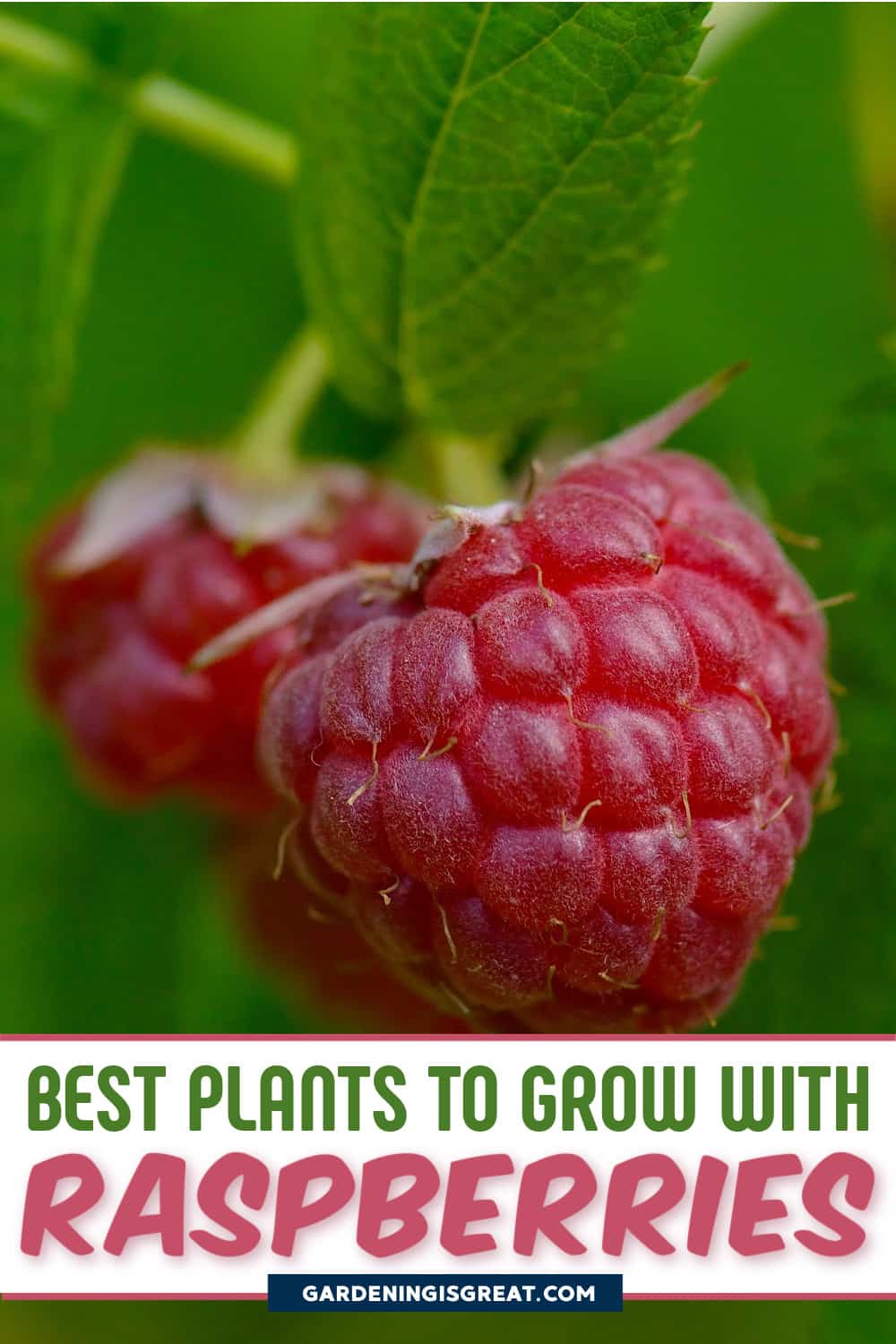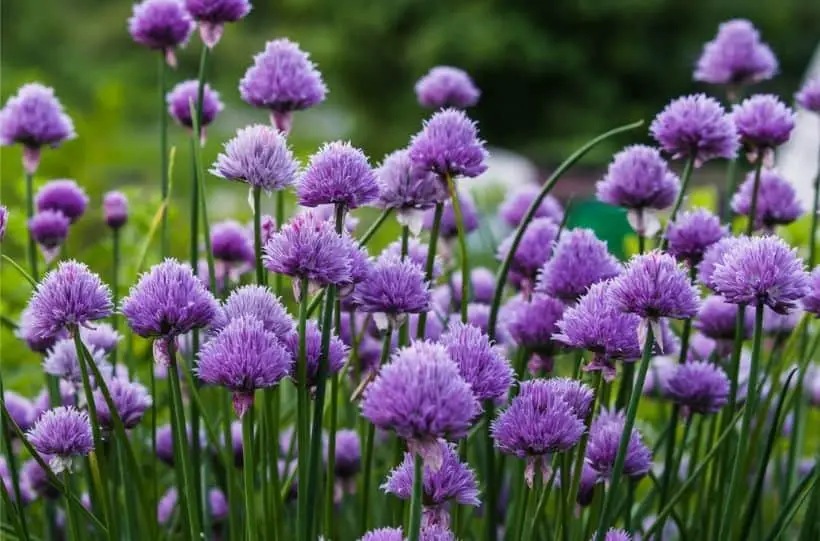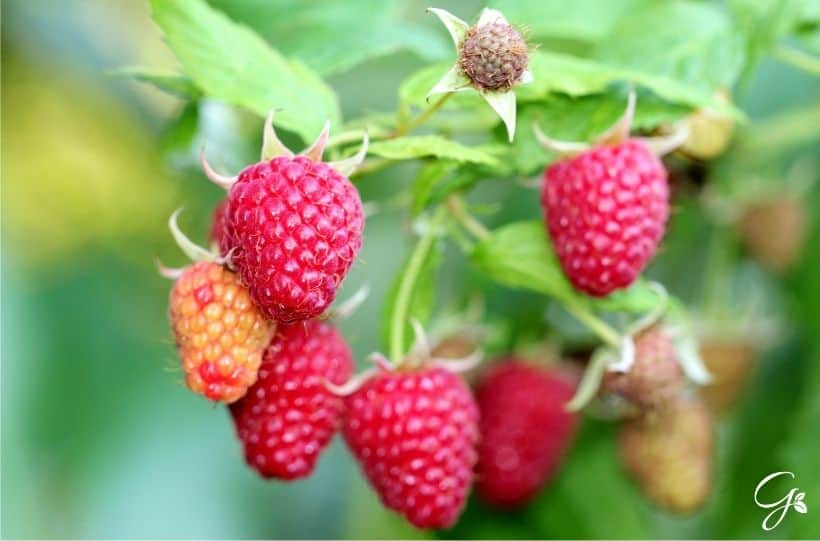9 of the Best Raspberry Companion Plants
Raspberries are relatively easy to grow when provided with ideal conditions:
- A sunny location
- Well-drained soil
- Shelter from strong winds
- And slightly acidic soil.
But, like all crops, they are susceptible to garden pests and could always benefit from extra support through companion plants.
Raspberry companion plants can help by offering more nutrients, encouraging pollinators, and repelling pests. Keep reading to find out which companion plants can benefit your raspberries and which plants you should avoid.

9 Raspberry Companion Plants
Here are 9 companion plants that can be planted with your raspberries and help them to grow:
Buckwheat
Buckwheat is used as a companion plant for many crops due to its nutrient properties. Planting buckwheat before planting your raspberries will help add nutrients back into the soil.
It particularly thrives in poor soil conditions and helps to rejuvenate the soil by adding natural organic matter. During flowering, it can attract pollinators to your site and provide food.
Once your buckwheat has finished growing, it can be cut down and added to the soil as mulch. It protects the soil during the winter from UV damage from the sun and from the winter elements.
Clover
Clover, particularly white clover and crimson clover, act as cover crops around your raspberry plants. By covering the ground, they minimize weeds from growing and competing for space and nutrients.
Clovers also provide additional nutrients that your raspberry plants can benefit from. Specifically, clover plants help to fix the nitrogen levels in the soil, ensuring they are balanced, which surrounding plants can also benefit from.
Thirdly, when in bloom, clover has bright flowers full of pollen, making them attractive to pollinators. They help attract insects such as wasps and bees which will pollinate your raspberry plants, but also bugs such as lacewings which will prey on pests.
Rue
Rue is an old traditional herb which, although isn’t as often used anymore, can provide many benefits when planted with your raspberry plants.
Rue supports your raspberries in two ways. Firstly, when flowering between June and September, it helps attract pollinators.
Secondly, as it has a strong scent, it acts as a natural insect repellent deterring pests away from your raspberry plants. Rue can especially repel Japanese beetles, slugs, aphids, snails, and more.
Planting rue can be ideal if you don’t have as much space for several plant varieties due to benefitting your raspberry plants in more than one way.
Alliums
Alliums include garlic, chives, onions, and leeks. They make incredibly effective companion plant due to their strong, unique scent. Their scent helps protect your raspberry plants from pests as it deters pests.
Some alliums like chives grow bright and bold flowers that help to attract pollinators to your raspberry plants.

Alliums such as garlic and onions can also help your raspberry plants by protecting them from fungal infections.
Turnip and Yarrow
Turnip and yarrow are other excellent companion plants for raspberries. They help deter Harlequin beetles by acting as a trap crop and minimizing their impact on raspberries.
Yarrow also offers yellow flowers between June and November, helping to attract pollinators.
Marigolds
Marigolds can help your raspberry plants both above and underground. Above the ground, marigolds are brightly colored in shades of yellow, orange, and red. They help to attract beneficial pollinators, with many also acting as natural predators for pests.

In the soil, marigolds help minimize the risk of diseases such as ringspot virus, which can be devastating for raspberry plants.
Finally, when planted around your raspberry plants, they can act as a trap crop, particularly for slugs and snails, which love to feed on raspberry plants.
Nasturtiums
Another attractive plant similar to marigolds, nasturtiums are bright orange flowers that are full of nectar for pollinators such as bees and butterflies.
They also act as an additional trap crop but specifically for weevils, beetles, and aphids. Nasturtiums interplanted with marigolds can create a natural defense barrier around your raspberry plants.
Lavender
Lavender makes an excellent raspberry companion plant. It has a highly attractive scent and purple flowers, which are an ideal combination for attracting beneficial pollinators such as butterflies and bees.
Due to their strong scent, they are also unappealing to a range of insects and pests, helping to protect your raspberry plants.
What Should NOT Be Planted With Raspberries
Although many plants make excellent raspberry companion plants, certain crops should not be planted with raspberries.
Nightshades
Nightshades include tomatoes, eggplants, and potatoes. These plants are incredibly susceptible to blight and fungal diseases that can easily spread and kill your raspberry plants.
Berries
Although berries are an excellent taste combination alongside raspberries, you should avoid planting them together. This includes strawberries, blackberries, gooseberries, and boysenberries.
As they are so similar when grown in the same environment, diseases such as verticillium can easily spread between them, killing both crops.
Fennel
Fennel isn’t an ideal companion plant for most crops. It has a natural defense against pests which involves releasing a chemical from its root that deters pests away. However, this very same chemical can spread and impact plants nearby, stunting their growth.
So, if you are considering growing raspberries at home, make sure to take a look at this raspberry companion plant list before planting. This will help you not only prepare the soil with organic matter but avoid the spread of diseases.

Planting a range of flowers from this list will also aid your raspberry plant growth by encouraging pollinators to visit and pollinate your raspberry flowers whilst also deterring a vast range of pests.
For more support in planning your garden to maximize your crops growth potential, make sure to take a look at these fellow companion planting guides:
- 8 Ideal Cauliflower Companion Plants
- 11 of the Best Pepper Companion Plants
- 9 of the Best Companion Plants for Swiss Chard
- Cucumber Companion Plants: What to Plant with Cucumbers
- Companion Planting Potatoes: The Best Potato Plant Companions
- Ultimate Guide to Companion Planting in Your Vegetable Garden

